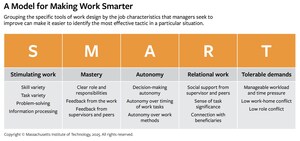CAMBRIDGE, Mass., Nov. 1, 2023 /PRNewswire/ -- It is not common knowledge in the U.S. that caste and caste discrimination exist, but as globalized, mobile workforces become the norm, organizations are beginning to recognize the complexities they present. MIT Sloan Management Review identifies the unique challenges caste poses to managers and ways to identify and address this bias to create a more equitable workplace.
"Caste is neither archaic nor confined to South Asia or those who practice Hinduism. It is a contemporary and resilient system that is prevalent around the world and across religions," asserts Hari Bapuji, a professor of management at the University of Melbourne and a cofounder of Action to Improve Representation. "Because caste cannot be seen from one's physical features, there are unique challenges for managers."
Bapuji and the coauthors of "What Managers Everywhere Must Know About Caste" clarify how caste operates indirectly through identity, resources, networks, and culture. Together, these dimensions shape the perception of an individual's merit. Caste discrimination in workplaces is, therefore, not always explicit but can manifest as biases, stereotyping, and exclusionary practices that are difficult to recognize and address.
Multinational companies, such as Alphabet, Amazon, Apple, Dell, and X (formerly Twitter), have recognized the importance of this issue by addressing caste-based discrimination in their policies. "What Managers Everywhere Must Know About Caste" urges leaders and organizations to:
- Explicitly identify caste as a protected category: Make caste a protected category. Include caste in company codes of conduct, such as for suppliers and communications. Employ equitable procedures for hiring, job assignments, and promotion. Put protocols in place to address complaints of caste discrimination.
- Increase awareness and training: Provide DEI training. Coach managers. Create inclusivity in teams. Handle caste-sensitive issues. Raise awareness.
- Tackle caste discrimination at its root: Provide scholarships, coaching, and training for low-caste individuals. Create opportunities. Make philanthropic support conditional on nongovernmental organizations and charities being caste-inclusive.
- Preempt resistance to address caste: Understand the sources of resistance and stakeholders involved. Address resistance through thoughtful and tactful communications to secure buy-in. Design external communications to create broad-based support for caste inclusion.
"Caste is a complex and difficult issue, but addressing it is both an instrumental and moral imperative for organizations around the world. Doing so contributes to more equitable outcomes for individuals and affirms organizational commitment to cocreating a fairer and more equal society for all," added Bapuji.
The MIT Sloan Management Review article "What Managers Everywhere Must Know About Caste" publishes at 8 a.m. ET on Nov. 1, 2023.
About the Authors
Hari Bapuji (@haribapuji) is a professor of management at the University of Melbourne, Australia, and a cofounder of Action to Improve Representation. Kamini Gupta is a lecturer of management at King's College London, where she also hosts the India Series, fireside chats focused on topics of urgent relevance to India's growth and place in the world. Snehanjali Chrispal is a lecturer of management at Deakin University, Australia, who researches inequality and organizations, particularly human rights issues like gender and caste. Thomas Roulet is a professor of organizational sociology and leadership at the Judge Business School and a fellow of King's College, both at the University of Cambridge.
About MIT Sloan Management Review
MIT Sloan Management Review is an independent, research-based magazine and digital platform for business leaders published at the MIT Sloan School of Management. MIT SMR explores how leadership and management are transforming in a disruptive world. We help thoughtful leaders capture the exciting opportunities — and face down the challenges — created as technological, societal, and environmental forces reshape how organizations operate, compete, and create value.
Connect with MIT Sloan Management Review on:
Tess Woods
[email protected]
617-942-0336
SOURCE MIT Sloan Management Review

WANT YOUR COMPANY'S NEWS FEATURED ON PRNEWSWIRE.COM?
Newsrooms &
Influencers
Digital Media
Outlets
Journalists
Opted In






Share this article